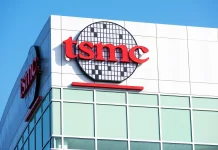Taiwan Semiconductor Manufacturing Co Ltd (TSMC) is expected to announce a 30% decline in third-quarter profit on Thursday, reflecting a slowdown in the chip industry. Analysts had anticipated this slump, with the company’s profit estimated at $6 billion for July-September. This marks the second consecutive quarter of profit decline for the world’s largest contract chipmaker, attributing it to the weakened global demand for semiconductors since the latter half of the previous year.
TSMC’s revenue for the third quarter stood at approximately $17 billion, down 20% from the previous year, a figure well within the company’s projected range. This downturn mirrors the industry’s trend as inventories at smartphone and computer manufacturers diminish, paving the way for an expected uptick in restocking demand.

Despite these challenges, TSMC’s stock price has surged due to increased chip demand for artificial intelligence applications. Investors, however, remain cautious as the company navigates uncertainties in customer demand. Reports suggest that TSMC has urged its major suppliers to delay the delivery of high-end chip-making equipment, although the delay is anticipated to be short-term.
Analysts are closely monitoring TSMC’s outlook for the fourth quarter and beyond and have predicted a slow start to the next year, with a 10% growth expected in the first quarter. Concerns loom over potential order cancellations towards the end of the year and mild restocking demand. The fate of TSMC’s partnership with major customer Apple remains pivotal, with analysts expressing worries that Apple might revise its orders.
TSMC reported its net revenue for September 2023 at approximately NT$180.43 billion, reflecting a 4.4% decrease from August 2023 and a 13.4% decrease from September 2022. The cumulative revenue for January through September 2023 amounted to NT$1,536.21 billion, indicating a 6.2% decrease compared to the same period in 2022.
The semiconductor industry’s recovery hinges on various factors, including the global economic climate, consumer demand, and technological advancements. Analysts remain cautiously optimistic about TSMC’s future, emphasizing the need for adaptability and strategic planning in the face of evolving market dynamics. TSMC’s performance in the coming quarters will undoubtedly be closely watched by industry stakeholders and investors alike.
Related:
- TSMC granted indefinite waiver by US for Chip Equipment exports to China
- Huawei Kirin 9000s actually a 5nm Kirin 9000 chip made by TSMC 3 years ago, not SMIC, claims tipster
- TSMC to produce cutting-edge Chips in second Japan plant with government subsidies
(via)






